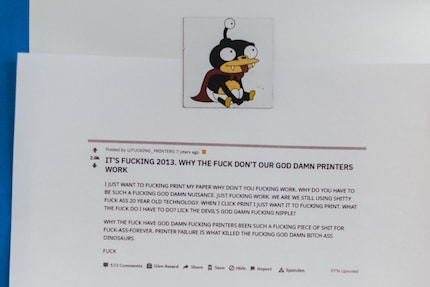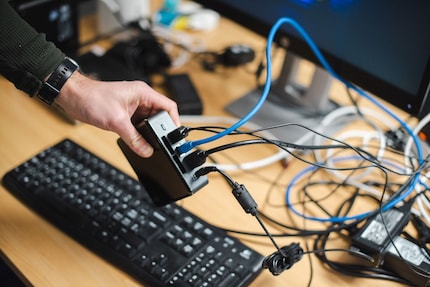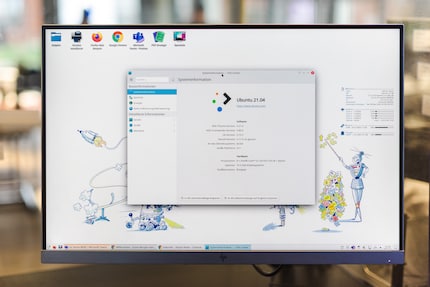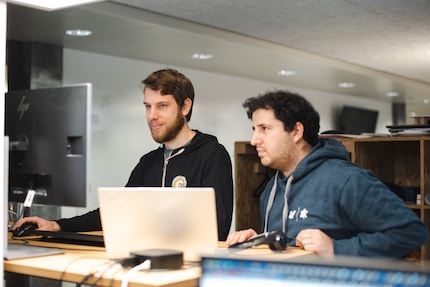
Behind the scenes
Digital sovereignty: why we trust our developers more than big tech
by Thomas Gfeller

Our developers have created an operating system for mini computers that makes the traditional computers in our warehouses and shops redundant. This new system is a way to avoid electronic waste, frazzled staff and costs that run into the millions.
Even if there were double the number of hours in a day, Thomas Gfeller and his team wouldn’t have gotten through the year unscathed. The Planet Express team would have been overwhelmed by the workload. The reason being that, together with IT support, they’re responsible for equipping all the new work stations with computers and connecting them to the network. And these work stations are sprouting up all over the place.
«Digitec Galaxus had a huge growth spurt in a short space of time,» Thomas says. This is down to the global Coronavirus pandemic, which boosted e-commerce. «We had to rapidly increase the logistics,» he explains.

This isn’t something that happens overnight. «You first need more warehouses, more shelving units, and eventually, also more computers – which means more hardware,» Thomas explains. With Digitec Galaxus’s constant growth, this would mean that IT support and Planet Express would keep having to install new computers and manage them. Which is quite frankly an impossible task. Because Planet Express also looks after the entire intranet, IT security, two Clouds, the Microsoft Office ecosystem as well as the printer environment.

«Obviously, we could have also just set up two or three other teams specifically to install and manage new Windows computers all day,» Thomas points out with a frown. «That would have cost us a few hundred thousand francs per team per year.» But it didn’t come to that. Planet Express managed it all in a much more elegant way. Rather than upping the number of developers, they slimmed down on machines.
The idea behind it is that not everyone who works at Digitec Galaxus is reliant on having their own computer every day. In the main warehouse in Wohlen and across stores from St Gallen to Geneva, staff need their devices for three main tasks: communicating via Microsoft Teams, surfing on the backend of the shop and logging working hours. You can do all of that in Firefox or another browser.
Traditional computers can now do much more than they used to. Which is why it makes sense to use devices with less computing power for specific tasks such as browser access. In computing, these kinds of devices are called thin clients. Unlike traditional computers – also known in tech speak as fat clients – thin clients are maintenance-free, don’t save any data locally and can be started directly via the network.
Thomas and his team created a thin client system similar to this for use at Digitec Galaxus. They built it using various open source components from the Internet. The result is not bad at all. Thanks to this software set-up, the company can now use devices across all its warehouses and shops that are faster to install, easier to transport, safer and a lot cheaper than traditional computers.
That’s because Planet Express’s thin clients have a special feature. Namely that they load the operating system as a package in the memory and are then no longer reliant on a server in the backend, as traditional thin clients used to be. As a result, there’s no extra work involved for Thomas’s team in the form of managing them. «I can’t think of any other case where that was done,» he says, emphatically. Meanwhile, these thin clients have now replaced almost all the large PC boxes in Digitec Galaxus’s stores and warehouses.

You don’t need much to set up a thin client. Thomas fishes a small square box out of a big pile of cables. The box is an NUC, which is a mini PC from Intel. «This is the body for the thin client,» Thomas explains. In this case, it’s a custom-made design from Little Bit – «but that’s the great thing about thin clients. They work almost everywhere,» he points out. When he says everywhere, he means all devices that have a processor with a minimum of x86 architecture. That should be a lot of devices these days, as that technology is from the 80s.
The machine starts as normal. This means that the «gears» of the solution are slightly more visible. Thomas presses a button and lines of code immediately populate the screen. «The device loaded an operating system from the network and started it locally,» says Thomas as he looks up from the screen.
And now comes the special part. «The thin client loads the operating system in the memory – there’s no hard disk in there,» Thomas continues. We intentionally didn’t build these into our NUCs. For one, because these are often the first part to fail. And also because it drives down the cost of the overall device.


Once the thin client starts, users can input their normal company login details. And then a desktop appears. At first glance, it looks like Windows – but it’s misleading. «We knew that if we wanted to reduce costs and simplify things, we wouldn’t be able to use Windows as our operating system,» Thomas points out. «For daily use, Windows has its quirks – which is why we quickly came to the conclusion we needed to opt for Linux.»
This operating system has its advantages. Unlike Windows and MacOS, it’s free and open source. That means the system’s «building blocks» are freely available online. «Our solution is made up of countless open source components, for instance Ubuntu, the open source Linux operating system that everyone can use. That’s what runs on the thin clients,» says Thomas.

The slight drawback is that there’s not much enthusiasm for the operating system and its gems outside of software development. «It goes without saying that there were a few critics who wanted to go back to Windows. People are creatures of habit, after all,» Thomas explains.
But he denies that the majority of users were actually against it. «We were also met with a lot of encouragement, as we actively responded to queries,» says Thomas. For instance, when store staff requested it, Thomas and his team completely overhauled the desktop interface to make the switch to Linux as seamless for them as possible.
Right from the outset, IT support was enthusiastic about mini computers. «Their team has a lot fewer orders for PCs and fewer support requests,» explains Thomas. «Now if you want to set up a thin client, all you need to do is plug in an HDMI, USB and network cable,» he continues.
«This solution allows us to set up a hundred new workstations without it even taking a second of our time,» says Thomas. «With Windows, that would have been problematic. In that scenario, you don’t just have to deal with the operating system; you also have to install the anti-virus software and updates and prepare the software package – along with a whole host of other things.» None of that comes into the picture with thin clients – and neither do license fees. And as if that weren’t enough, Thomas points out that «the devices are always up to date with the latest update of the software».


It’s hard to ignore the fact that Thomas and his team enjoy working on this solution. So much so that they want to allow other people to feel that way too. That’s why Planet Express published the code for their solution on the developer platform Github.
In practice, this means that any developers who are interested now have free access to it. «For us, it was important to give back, since we’ve used a lot of software components from the open source community,» says Thomas. «It’s our way of saying thank you. And we’re looking forward to seeing what other new ideas the community comes up with.»
Releasing the code proved to be the icing on the cake for a project that was very close to the hearts of all those on Thomas’s team. Now that’s the topic of «thin clients» ticked off the list for the time being. Thanks to this solution using mini computers, the team at Planet Express was able to see out the year without any hassle.
Tickled your fancy? The project is also available for you to look at or even download to your device and play around with. It might even save you a few hours of work. Let us know in the comments.
«I want it all! The terrifying lows, the dizzying highs, the creamy middles!» – these words spoken by an iconic American TV celebrity could have been mine. It's a take on life I also apply to my job. What does this mean in concrete terms? That every story has its charm; no matter how small, large, exciting or trivial. The more eclectic the mix, the better.
News about features in our shop, information from marketing and logistics, and much more.
Show all